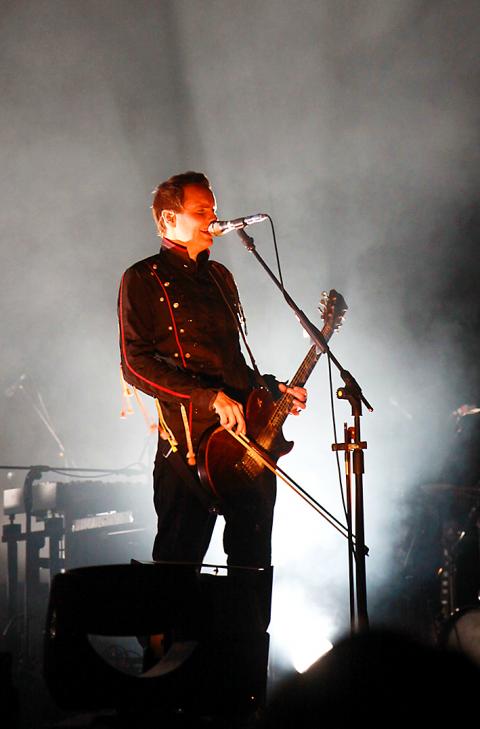When Sigur Ros took to the stage last Wednesday night at the National Taiwan University Stadium, it was to a room of people sitting in folding chairs. Promoters probably expected that the ambient band would put people to sleep with their celestial sounding songs. But instead, the Icelandic ensemble delivered an unforgettable and mind-blowing exhibition of sheer talent that left fans quite literally scrambling over their seats just to get a closer look at the band.
Maybe it was because this was Sigur Ros’ first performance in Taiwan and people didn’t know what to expect of a band categorized as minimalist and post-rock, but the show started slow. Perhaps the crowd needed a minute to fully absorb how the hypnotic coos coming from lead singer Jonsi Birgisson made them feel. But in the blink of an eye, life charged through some very serious listeners and most of the audience rose to their feet, some even stood on their chairs. And that’s when the concert really began.
As the show went on, emotional intensity continued to build up as brooding melodies carried over into tremendous build-ups that when released, even sparked some soft head banging from the crowd. But for the most part, it seemed concertgoers stood enraptured with their mouths agape.

Photo: Olivia Wycech, Taipei Times
This is probably because they couldn’t sing along, since the band sang mostly in Icelandic or Hopelandic, a made-up language that the band says is supposed to evoke a unique experience in every listener. But, despite very few distinguishable characteristics between songs, fans seemed to know every song from the very first chord and responded with roaring cheers and applause.
It didn’t matter that no one could understand Birgisson because his falsetto voice was an ethereal instrument to enjoy all on its own. He hit and held, quite literally, every note so well that he seemed to impress even himself. Birgisson’s exquisite projection of sonic sublime resonated in breathtaking moments where people simply stood mesmerized, with their eyes closed.
Although Birgisson was joined on stage by his core band and a small orchestra of six, it was still he who, after every apex, continued to enthrall fans by theatrically playing his electric guitar with a bow. Later, he would sing with the microphone pressed against his forehead. This is all part of the idiosyncratic nature that has defined the band since they formed in 1994.
At one point, the band paused dramatically mid-song and motion, which clearly confused the crowd as bouts of awkward cheers kept erupting sporadically. While many people didn’t know what to do with the silence, the people that understood what was happening quickly shushed them and savored every second of the silence bestowed upon them by Sigur Ros.
The encore was thunderous and immediately after the show, one fan on the group’s Web site even compared it to an out-of-body experience. It seemed that Sigur Ros far exceeded expectations and won the hearts of many new fans along the way.

On April 26, The Lancet published a letter from two doctors at Taichung-based China Medical University Hospital (CMUH) warning that “Taiwan’s Health Care System is on the Brink of Collapse.” The authors said that “Years of policy inaction and mismanagement of resources have led to the National Health Insurance system operating under unsustainable conditions.” The pushback was immediate. Errors in the paper were quickly identified and publicized, to discredit the authors (the hospital apologized). CNA reported that CMUH said the letter described Taiwan in 2021 as having 62 nurses per 10,000 people, when the correct number was 78 nurses per 10,000

As we live longer, our risk of cognitive impairment is increasing. How can we delay the onset of symptoms? Do we have to give up every indulgence or can small changes make a difference? We asked neurologists for tips on how to keep our brains healthy for life. TAKE CARE OF YOUR HEALTH “All of the sensible things that apply to bodily health apply to brain health,” says Suzanne O’Sullivan, a consultant in neurology at the National Hospital for Neurology and Neurosurgery in London, and the author of The Age of Diagnosis. “When you’re 20, you can get away with absolute

May 5 to May 11 What started out as friction between Taiwanese students at Taichung First High School and a Japanese head cook escalated dramatically over the first two weeks of May 1927. It began on April 30 when the cook’s wife knew that lotus starch used in that night’s dinner had rat feces in it, but failed to inform staff until the meal was already prepared. The students believed that her silence was intentional, and filed a complaint. The school’s Japanese administrators sided with the cook’s family, dismissing the students as troublemakers and clamping down on their freedoms — with

As Donald Trump’s executive order in March led to the shuttering of Voice of America (VOA) — the global broadcaster whose roots date back to the fight against Nazi propaganda — he quickly attracted support from figures not used to aligning themselves with any US administration. Trump had ordered the US Agency for Global Media, the federal agency that funds VOA and other groups promoting independent journalism overseas, to be “eliminated to the maximum extent consistent with applicable law.” The decision suddenly halted programming in 49 languages to more than 425 million people. In Moscow, Margarita Simonyan, the hardline editor-in-chief of the